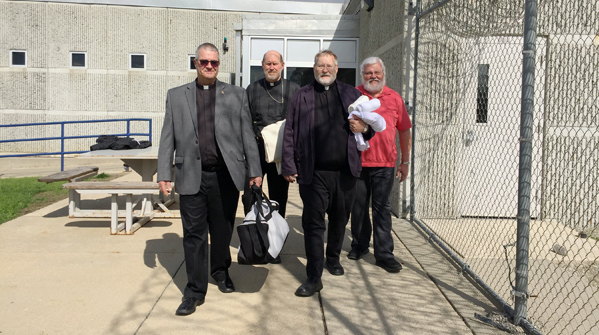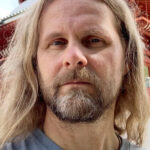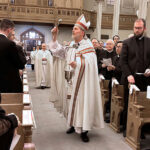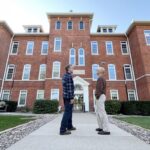
Leaving the Newton Correctional Facility in Newton are, from left, Deacon Lowell Van Wyk, Bishop Thomas Zinkula, Deacon Tom Hardie and Deacon Joe Dvorak. Bishop Zinkula celebrated Mass for inmates at the medium security facility on May 2. The deacons offer Communion services on alternating weeks. Mass is celebrated twice monthly.
Bishop celebrates Mass at Newton Correctional Facility
By Barb Arland-Fye
The Catholic Messenger
NEWTON — Most of the 30 men gathered for Mass in the library/chapel of the Newton Correctional Facility raise their hands when Deacon Lowell Van Wyk asks: “How many of you will receive Communion?”
The 30 inmates, incarcerated at the medium security facility, anticipate receiving Communion from Bishop Thomas Zinkula, who is presiding at the Mass on May 2 — a year after he celebrated his first Mass here. At the present moment, the bishop is hearing individual confessions of some of the 30 men in another room.
As the others wait with Deacons Van Wyk, Tom Hardie and Joe Dvorak, one inmate asks: “Have you met the bishop before?” Deacon Van Wyk smiles and responds, “Yeah, we kind of work for him.”
The deacon tells how he and other members of Deacon Class VII, including Deacon Hardie, parked cars for people attending the Mass at which Bishop Zinkula was ordained and installed as Bishop of the Diocese of Davenport in 2017. A month later, he ordained the deacons.
Ed, who leads his fellow inmates preparing for Mass, asks a question about Arianism, a fourth-century heresy which denied the divinity of Christ. Bishop Zinkula, hearing the discussion as he reenters the chapel says, “That’s pretty deep stuff!”
Mass begins with the opening hymn, “How Great Thou Art.” Afterwards, Bishop Zinkula greets the men, “It’s good to be with you guys once again. I missed you. It’s good to be reunited with you, and for all of us to be reunited with the Lord.”
John, an inmate, reads the first reading, a compilation of two readings from The Acts of the Apostles —that day and the previous day’s reading — which Bishop Zinkula selected as inspiration for his homily.
The freedom of Christians
“We hear about the apostles being thrown in a public jail because they were preaching the Good News, healing the sick and casting out demons,” the bishop begins his homily. “During the night, an angel of the Lord opened the doors of the prison and led them out. Don’t get your hopes up, guys!”
The men respond with laughter. “But then again, you never know!” the bishop continues. “Maybe an angel of the Lord will wander or fly in here someday and open the doors of this prison prior to the end of your sentence!”
While acknowledging that physical freedom is a good thing, the bishop reminded the inmates that they have freedom of mind, heart, soul and spirit. “You have the capacity to decide for, and to reach out for, truth and goodness. You have the capacity, with God’s assistance, to be more fully the person God created you to be.” Payton, an inmate sitting in the back row, nods his head in agreement.
Whether in prison or not, everyone has the opportunity to choose between two courses of action, which often means choosing between good and evil, the bishop says. To decide on evil is not the use of freedom but rather a choice to “walk in the land of darkness.”
Bishop Zinkula reminds the inmates that Jesus “died on the cross and rose from the dead in order to set us free from sin and death — whether or not we are in prison.”
Christians have the freedom to pray and grow closer to God, forgive others, read the Bible and learn more about the teachings of the Catholic faith and grow in faith, hope and love and joyfully share the Good News of Jesus Christ with others. Whether or not in prison, Christians have the responsibility to do these things, the bishop says.
“After opening the doors of prison and leading the apostles out, the angel we heard about in the passage from the Acts of the Apostles instructed them to go to the temple and tell people everything about the Christian life. That is our instruction and duty as well.”
The bishop advises the inmates: “If we don’t feel free enough to do that, it is imperative that we ask the Holy Spirit for the gifts we need in order to do it — wisdom, knowledge, understanding, piety, right judgment and fear of the Lord.”
“May we never take for granted or put on a shelf the freedom of the children of God. May God send an angel to open the door to our hearts so that we might be freed to joyfully recognize, embrace, celebrate, live and share the Good News of the Risen Christ no matter where we find ourselves.”
In communion
Deacon Dvorak whispers a request to Payton and his seatmate Bryan to bring up the gifts for Communion. They pick up the ciborium and travel kit-sized bottle of wine from a shelf on a bookcase in the back of the room. Deacon Hardie prays the Prayer of the Faithful, which includes an intention for the inmates to receive the counseling and healing they need to return to society. During the sign of peace, the inmates extend a hand to each other, the bishops and deacons. Some of the inmates leave immediately after receiving Communion because of a counseling appointment or work assignment. The others kneel on the concrete floor and bow their heads and pray after receiving Eucharist.
John, who will be 73 this month, never misses Mass, offered twice a month at the facility. The bishop’s presence here today is a special opportunity to celebrate. The Catholic faith “means everything to me,” John says.
Another inmate named John describes Bishop Zinkula as a “great man, common as an old shoe and just about as comfortable. He’s easy to talk to and easy to be around. He makes a person feel relaxed and at ease.”
Twenty-one-year-old Trevor was raised Lutheran but says he sees many similarities with Catholicism and is in the process of entering the Catholic Church. He especially appreciates the communal aspects of this Mass – coming together in song, to exchange the sign of peace, to receive Communion and to genuflect for Jesus Christ.
Vinny, 36, says he experiences the Mass and Communion services offered at the Newton Correctional Facility as “cleansing.” He appreciates how the bishop’s homily “compared our incarceration to the apostles.” But Vinny most appreciates the bishop identifying himself as “Me, your unworthy servant” during the Eucharistic Prayer. “He’s a bishop, and to hear him say ‘Me, your unworthy servant’ makes me feel like I’m not so low … it lifts me up. We’re all unworthy of God and yet he grants us salvation anyway.”











